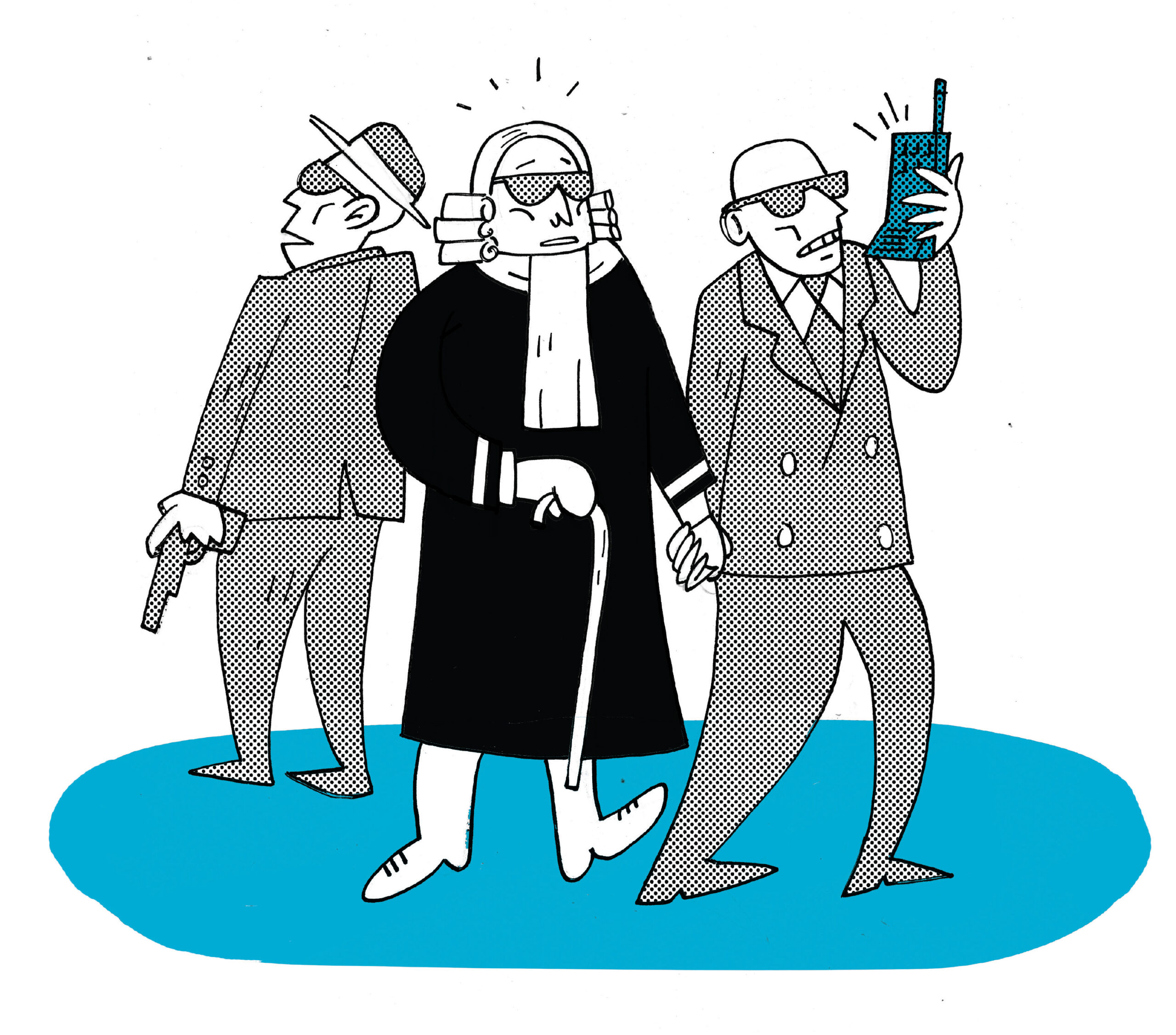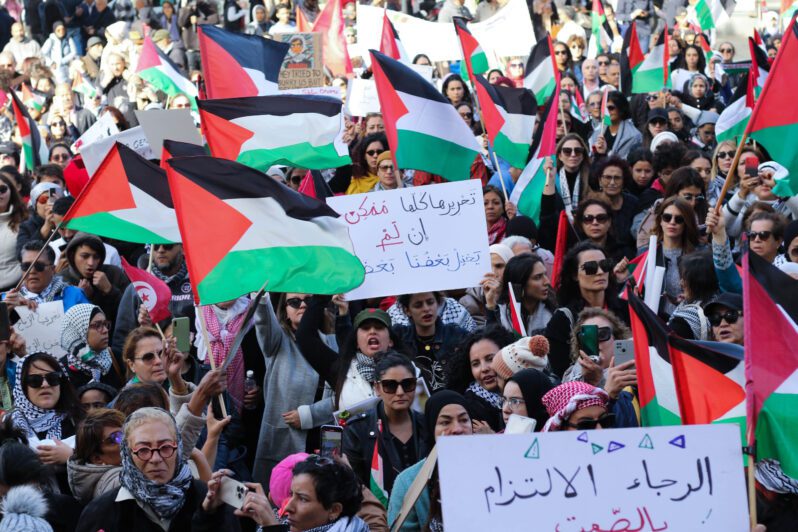Bearing Witness in Tunisia: Injustice in the Eyes of its Victims

Interview with Khamis al-Shammari, Mohammed Abbo, and Saleh al-Mansouri
Editor’s note: In 1969, the State Security Court of Tunisia sentenced Khamis al-Shammari, a university student and a Perspectives Tunisiennes movement left-wing activist, to two and a half years in prison for charges related to his union, student and political activities. Eleven years later, Saleh al-Mansouri, who was a financial judge, was taken to court for his activity in the Movement of Islamic Tendency (currently Ennahda party). The same court sentenced him to 10 years imprisonment. Twenty years later lawyer Mohammed Abbo, who has not been known to commit to a specific ideological line, was brought before the judicial judiciary for public right charges. He was sentenced to four years in prison in two separate cases. The real reason for his imprisonment was because he published messages online that exposed the financial corruption of the family of then President Zine El Abidine Ben Ali. Each of these victims belong to a different generation that bore witness to the machinations of First Tunisian Republic. They also have and represent different political affiliations. On the other hand, they were all tried for political reasons and were engaged in public affairs as human rights and political activists before and after the revolution.
The Legal Agenda conducted separate interviews with each activist to inquire about their views on the judiciary. We chose a judge as their interlocutor. Our approach was intended to break away from what has become conventional after the revolution, namely getting judges to speak about the judiciary and its needs. Rather we got the judge to seek such knowledge from from those who had experienced firsthand like our interviewees.
Our three interviewees unanimously agreed on the lacklustre role of the judiciary in the their trials. Khamis al-Shammari, who was part of a student delegation that headed to the dean’s office of the Faculty of Sciences in Tunisia to negotiate with him about student protests, recalls how he found the security forces waiting for him, and how they violently arrested him despite the sanctity of the place where he was arrested. Al-Shammari notes that this arrest took place in the presence of the undersecretary of the republic, adding: “What I still can’t wrap my head around is how the judge allowed this violent treatment of me in his presence”.
Saleh al-Mansouri was subjected to the same trauma by the judiciary. He states that he was arrested on July 24, 1981 on charges of affiliation to an unauthorized association, dissemination of false news, and insulting the president of the republic. “The Supreme Judicial Council was not informed of my detention, and I was tried without lifting the criminal judicial immunity even though I was a practicing judge. I was sentenced to prison in a session that I thought would end in my acquittal”, he says.
The same disappointment was awaiting Mohammed Abbo who told us that he informed the investigating judge on March 2, 2005 that he insists on refusing to answer the accusation because of his lack of confidence in the judiciary. Nonetheless, the investigating judge chose to falsify the minutes of investigation by instructing the clerk to write that Abbo requested a delay.
Based on his experience, al-Shammari concluded that “the judiciary was under the control of authorities, and judges were only implementing instructions to lay out effective criminal sentences. This made their role in the trial negligible”. Even the questions they ask seem superficial which makes him feel “sorry” for them, because they would go out of their way acting the role of justice while the fact of the matter is they were only carrying out specific instructions. They did not have their own role manifesting their convictions.
The same idea was confirmed by Mohamed Abbo who said that, “the judiciary’s submission to the executive authority peaked during the rule of Zine El Abidine Ben Ali” where courts witnessed trials he described as pathetic. Abbo cited the trial of Hamma Hammami, Samir Taamallah and Abdeljabbar Madouri before the Trial Chamber of the Court of First Instance in Tunisia on February 2, 2002. He said that the above-mentioned objected to a sentence in absentia that was issued against them in 1999 on charges of affiliation to an unlicensed association. Instead of deciding on their objection in form, as per the law, the judge just said this in the hearing: “Hamma Hammami…Sentence remains as is”. The hearing, followed by the sentence, “was quite the judicial scandal that exposed the system of the judiciary of instructions”.
Al-Shammari agreed with Abbo’s description of the judiciary as subordinate to political authority during the reign of presidents Bourguiba and Ben Ali, but disagreed with him on the details concerning how authorities viewed the judiciary. Al-Shammari stated that “for Bourguiba, the judiciary was the least of his concerns”. Al-Shammari attributed Bourguiba’s position on the judiciary to two reasons: First, Bourguiba was a lawyer and thereby was aware that an independent judiciary could pose a threat to his authority. The second reason is personal. Bourguiba looked down on judges. In one of his speeches, he said during the course of career at the courts, he was “impressed by one judge of French nationality. The rest of the judges were merely tools to carry out instructions”. Al-Shammari said: “Unlike Bourguiba, Ben Ali was interested in the composition of judges, but that was for the purpose of using them politically for his benefit. He gave judges some consideration, but that was so he could place a grip on the judiciary”.
For his part, Saleh al-Mansouri justified his decision to continue his political activity in the Movement of Islamic Tendency –although he was a practicing judge and the law prohibited judges from joining political parties– due to the “political repression and the absence of an independent judiciary before the revolution”. He added: “the suffocating atmosphere made me do so”. Al-Mansouri went on to say that things changed after the revolution. That explains his decision to leave the party that he had contributed to founding, throughout the period when he returned to his work in the judiciary. He explains: “After the revolution, there was no longer a ban on political action and politics became an available option. That was missing in the past”.
Al-Mansouri went as far as condemning what he witnessed “in the judicial arena after the revolution: the phenomenon of non-commitment to political neutrality by a significant number of judges who were overwhelmed with ideological trends and who exceeded all the limits”. While al-Mansouri asserts that the Ennahda movement “sought to establish an independent judiciary and tried to achieve this through non-interference in judicial files”, he sees that “its efforts have ended in failure”. Al-Mansouri placed the blame on judges and the heightened political conflict. According to him, the Association of Tunisian Judges which was supposed to be a shield to protect the revolution, became overshadowed by “political calculations and governance mistakes, damaging the reputation of the judiciary and judges”. In such a political atmosphere, Ennahda did not have “many options, especially in dealing with the judiciary file”.
Al-Shammari did not have the same assessment in this regard. He said: “We have not seen anything from the successive governments except empty words and vague slogans about the independence of the judiciary and others, without any real concern with the judicial file”. Abbo made the same accusation against successive governments, saying: :”The judicial file has not been opened by any government. This is intentional, and for the purpose of weakening the judiciary so that it remains under the control of authorities and hence be used to serve their policies”.
We did not ask our interlocutors about constitutional and legislative reforms. Instead, we opted to wait for them to talk about them on their own, but none of them did. It was clear that they all agree that judges play a significant role in achieving the independence of the judiciary.
Al-Mansouri called on judges to abide by the principle of impartiality which he considered the main condition for their independence. He said: “It is necessary that judges stay away from politics and distance themselves from political parties, especially since we are now in the process of establishing the great principles; most importantly the impartiality of judges. Thus, adhering to neutrality is a must. It is a mindset that we learn to acquire.” Al-Mansouri added that the news he hears about tampering with judicial files makes him worried.
Abbo disagrees, stating that the judiciary has become “more independent after the revolution”. However, he emphasizes that it is a relative independence imposed by the political reality, rather than true independence. The latter should be accomplished by judges, in their search for ways to achieve justice. Abbo calls on judges to muster the courage to “separate the major files, especially those related to corruption”.
Meanwhile, al-Shammari emphasizes that “a judge is a state of thought. Laws cannot mold a judge…Laws are meaningless without a fertile soil”. Al-Shammari calls for more attention to be paid to the composition of judges as there is a lack in the cultural composition of judges. He underlined the need for judicial courage in this composition, saying that “we are only asking the judge to have the courage to reject instructions”. Al-Shammari stresses that this matter “requires the provision of financial guarantees for judges so they can feel independent”, adding that such guarantees are still absent under the deteriorating status of the courts and the financial status of judges”. Nonetheless, such absence “does not absolve judges of the responsibility to practice independence”, al-Shammari reiterated.
Moving on with our conversation, we asked our interlocutors to evaluate the presence of judges in the media. Al-Mansouri said that excessive talk on the part of judges about corruption in the media has resulted in the public losing confidence in the judiciary. The same negative assessment was made by al-Shammari who considered that, “those who led the judicial presence in the media did not leave a positive impression”. He considered the relationship between the judiciary and media a difficult equation that must be made to work. “Judges should not intensify their media appearance in a way that would make them come across as seditious fighters. This runs contrary to the fundamental characteristics of a judge”. For his part, Abbo emphasized that judges should be present in the media, but they should respect their status as judges”. On his assessment of judges' previous media presence, al-Mansouri confirmed that such presence is flawed and leaves a negative impression”. Answering the question about public confidence in the judiciary, Abbo said that “during 2011, public opinion was already an influential element in the judiciary, but this has declined later”. This conclusion was also emphasized by al-Shammari who believed that the public “no longer cares about the independence of the judiciary, although their daily talk confirms their lack of confidence in it, especially when they claim interference in issues that concern them”.
For his part, Abbo stressed that some of the pressures facing the judiciary today is not aimed at achieving independence of the judiciary, but rather at serving the interests of professional sectors. In order to support the independence of the judiciary, Abbo suggests “enactment of laws that prohibit citizens from gathering in courtrooms and around courts for the purpose of influencing judges’ decisions. Excessive pressure on the judiciary will inevitably lead to weakening it. We may win a sectoral battle but we will lose the judiciary”. Finally, al-Shammari warns judges of the danger of the sectorial discourse they are pushing for, as this could establish a closed circle of judges, conflicting with the revolution’s expectations from the judiciary.



